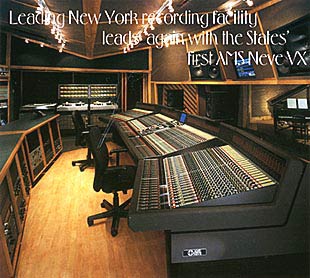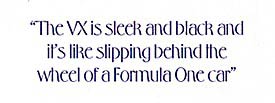 |
|
 |

"RIGHT TRACK COMES IN FIRST WITH THE NEW AMS NEVE VX CONSOLE"
Audio Media Magazine, February, 1997
It is hidden between the storefronts that line West 48th Street in Manhattan,
an almost anonymous doorway on the south side of the street with a brass-plated
intercom. Once inside, a long, white corridor leads to a private elevator
that transports one from the bustle of the street into the
tasteful, gracious reception area of Right Track Recording. And while it may have
taken a moment or two to find the door, the search is worth it, as it has
been for the last 18 years that the studio has been in this location for
hundreds of major recording artists such as Simple Minds, Whitney Houston,
Robert Palmer, Journey, Aretha Franklin, Freddie Jackson, Charlie Sexton and the Rolling
Stones, to name a few, who have found a home for their music at Right Track. The
guiding force behind Right Track for all of its years is Simon Andrews, a musician
in his native London, UK, who came to New York in 1969 as marketing director of a new
line of cosmetics from '60s British fashion designer Mary Quant, innovator of the
miniskirt and one of the moving pop-cultural forces of an era in which the term "gear"
was not used to represent technology but taste. Unfortunately, while Carnaby Street
took over US fasion like the Beatles dominated American radio and record sales,
Quant's cosmetics line went quickly and quietly to the charnel-house of couture,
despite Andrews' efforts. What he ultimately got out of the deal was a one-way ticket,
an American wife, a lifelong fascination with Manhattan and an opportunity to revitalize
his musical aspirations.
Right Track is the ultimate result of that quest, and the quintessential Manhattan
upscale recording facility, one that makes exceptional use of space in the city's
tight vertical real estate market, and one that has built its forefront position
on a combination of service and leading-edge technology. Right Track's technological
history is a chronology of the studio industry itself, as the studio's various
incarnations  passed through eight-, 16-, 24- and 48-track modes since its founding
in 1976 further downtown (It settled into 48th Street in 1979, designed by Andrews
and engineer/producer Frank Filipetti.) Right Track is now a three-room, state-of-the-art
recording facility, and two of its rooms offer artists, producers and engineers two of
the most exceptional consoles ever made.
passed through eight-, 16-, 24- and 48-track modes since its founding
in 1976 further downtown (It settled into 48th Street in 1979, designed by Andrews
and engineer/producer Frank Filipetti.) Right Track is now a three-room, state-of-the-art
recording facility, and two of its rooms offer artists, producers and engineers two of
the most exceptional consoles ever made.
Two years ago, Andrews became the first music recording studio in New York to install
an AMS Neve Capricorn, the all-digital console that has become the leading one of its
type in both music and post-production applications. Then, in early 1997, Right Track
became home to the first AMS Neve VX, the revolutionary new analogue
console which
combines the operational features that engineers want and the classic sonic characteristics
that artists and producers have long sought in vintage Neve designs.
"The demand for the Capricorn had been growing steadily ever since we installed it, to the
point where we are fully booked on it for months to come," says Andrews. "The benefits
of that desk have become quite apparent to everyone, from its operation to the fact that
they can work and archive in a 24-bit environment, which will give my clients a leg up
on new technologies like DVD."
LEADING EDGE
"With the digital end covered by the Capricorn, we wanted a great analogue console, one
that could offer a combination of great sound and great functionality. And we found that
in the AMS Neve VX. And noew every console in the facility - including the Capricorn
and the VX - offers our clients 96 inputs each, so they can work at the extreme leading
of edge of technology with a virtually unlimited number of channels."
Andrews is effusive about the VX's sonic performance, using terms such as "extraordinary"
and "magical" freely. Right Track's VX features Flying Faders automation, but will
incorporate the forthcoming Encore automation system later this year, says Andrews, as well
as AMS Neve's remanufactured classic 1081 EQ modules. "The VX has taken analogue
 sound
and operation about as far as it can go," he observes. "With the Encore system in place,
there will be a common platform covering all of AMS Neve's products, allowing engineers
to cross between the VX and the Capricorn easily and quickly, which will add significantly
to their creativity and productivity. And the 1081 modules are marvelous - AMS Neve
spent six months scouring the world to find the same components as the original 1081s and
has remanufactured them to the same specifications. So this gives us the best of the
classic and the best of the new in a single console. On top of that, it looks magnificent.
And after this many years in the business I can tell you that the way a console looks makes
a great deal of difference if you're going to have to come to work at it every day for hous
on end. The VX is sleek and black and it's like slipping behind the wheel of a Formula One
car. So in a lot of ways, the VX is simply good business. We all love beauty in our lives -
why not extend that to a recording console?"
sound
and operation about as far as it can go," he observes. "With the Encore system in place,
there will be a common platform covering all of AMS Neve's products, allowing engineers
to cross between the VX and the Capricorn easily and quickly, which will add significantly
to their creativity and productivity. And the 1081 modules are marvelous - AMS Neve
spent six months scouring the world to find the same components as the original 1081s and
has remanufactured them to the same specifications. So this gives us the best of the
classic and the best of the new in a single console. On top of that, it looks magnificent.
And after this many years in the business I can tell you that the way a console looks makes
a great deal of difference if you're going to have to come to work at it every day for hous
on end. The VX is sleek and black and it's like slipping behind the wheel of a Formula One
car. So in a lot of ways, the VX is simply good business. We all love beauty in our lives -
why not extend that to a recording console?"
INTUITIVE
According to Studio Manager Barry Bongiovi, the VX is already gaining fans: clients
in the first month or so of operation include Pat Metheny, Germany's Selig on Sony
International, Niko Bolas, a Dee Dee Bridgewater big band project and Bee Bee Wynans,
produced by the legendary Arif Mardin. "What's happening here is the same thing that hapeened
with the Capricorn," Bongiovi explains. "Clients come in and check out the console and within
 minutes they fall in love with it. They see an intuitive and powerful interface, and hear
the vintage Neve sound. How could you not love this console?"
minutes they fall in love with it. They see an intuitive and powerful interface, and hear
the vintage Neve sound. How could you not love this console?"
The installation of the VX was remarkable in its simplicity, states Right Track Technical
Director John Herman. "It went very quickly and very easily," he says. "We had spent about
two weeks prepping the room, rewiring the studio's mic lines and outboard wiring, as well as
doing a little bit of acoustical work on the control room with Frank Filipetti, remodeling
the racks and the wall fabrics. We also refinished the iso booths and added a Faraday cage to one fo the isos, which helps
further protect us from the heavy RF environment that is Manhattan. When you do those
kind of things to a studio that make it quieter, it can really reveal any noise faults
in the equipment. What is revealed this time is that the AMS Neve VX is one of the
quietest consoles ever made."
As Right Track progresses through its third decade as one of New York's - and the world's -
premiere recording facilities, Simon Andrews will be the first to tell you that staying at the edge of
technology is a relentless pursuit. But with the installation of the VX he believes that he can take a breather for a while
to come. "The business cycle is strong in New York right now, and adding the VX helps keep us at the top of the curve,"
he says. "And after twenty-some-odd years doing this, that's a nice feeling to have no
matter how long it lasts."
|
|
|
